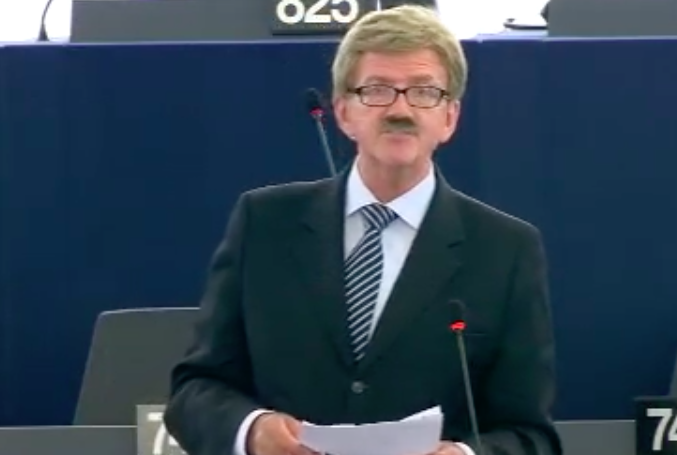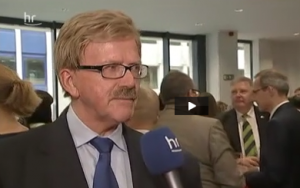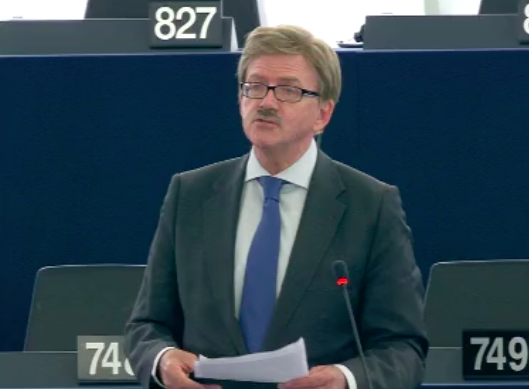Besuchergruppe in Straßburg Ausländerbeirat Langen (KV OF-Land)
Besuchergruppe in Straßburg Bürgerverein Eschersheim e.V. (KV FFM)
TTIP, occupational pensions & the Juncker Plan: CESI speaks to MEP Thomas Mann
Just in time before the Brussels summer recess, CESI spoke to MEP Thomas Mann about recent developments in EU employment and social affairs – most notably in relation to the current revision of occupational pension rules in the EU, the TTIP’s likely social impacts and the potential of the Juncker investment plan to create jobs. This interview continues the ‘CESI speaks to …’-series on insights into EU employment and social affairs hot topics.

Thomas Mann is one of the most experienced EU politicians in the field of employment and social affairs. As a German EPP affiliate, he has been a member of the European Parliament and its Committee on Employment and Social Affairs (EMPL) since 1994. Between 2004 and 2014, he was also Vice-chair of the EMPL Committee and has been a substitute member in the Committee on Economic and Monetary Affairs (ECON) since the late 1990s.
Mr Mann, occupational pension systems in Europe have been built over many decades by the social partners. In early 2014, the European Commission caused a stir when it proposed to revise the Directive 2003/41 on the activities and supervision of institutions for occupational retirement (the IORP II proposal). The file is now being worked on in the European Parliament. What is your view on the dossier?
During the last years, the European Commission has repeatedly tried to tighten the rules for occupational pension systems. In 2008 already, the German Bundesrat indicated that costs for the employers would rise by 20% if harmonisation plans for occupational pension schemes in the Commission became reality. As an MEP my group I have always spoken up against such plans – most recently as rapporteur in the ECON Committee in 2012 and 2013. Instead of “one-size-fits-all approaches” we need tailor-made rules for IORPs in those Member States where action is in fact necessary – for instance in Eastern Europe, where safeguards for occupational pensions are low. Social partners have repeatedly written joint letters to the European Commission, asking to not jeopardize the successful occupational pension systems that have been cautiously put in place over many years in countries such as Germany, Austria and Luxembourg. One such letter, sent in December 2014, noted: “The IORP proposal requires fundamental corrections. The Commission should – other than foreseen in its proposal – abstain from a full harmonisation of prudential supervision rules since this would not be suitable for the different framework conditions of occupational pension schemes in the Member States”.
What could a further European harmonisation in IORP rules mean for countries with cautiously balanced occupational pension systems such as Germany?
The occupational pension systems in European countries are as varied as the social systems. European regulations aiming at uniformity can therefore bring no added value for countries such as Germany, where safeguards for occupational pensions via the ‘Pensionssicherungsverein’ (Pension guarantee fund) are one of the best worldwide and have proven a strong resilience to crises to the test: Since 1975, there has not been a single case of insolvency. Here, harmonisation experiments from Brussels must be out of question. For this, too much is at stake: More than 20 million German citizens are entitled to this important form of pensions; the cover volume of their claims is more than 520 billion euros. More bureaucracy from Brussels would only mean higher costs. The payouts to the pensioners would suffer. Therefore, I believe: instead of full harmonisation, full subsidiarity must apply!
The EMPL Committee adopted its opinion just some weeks ago. How do you assess the outcome of the vote? What are the next steps?
On 28 May 2015 the EMPL Committee voted with 38 votes in favour, with 10 votes against and 2 abstentions against stricter occupational pension rules for countries like Germany. This was an important signal for the further direction of the negotiations on the file. Together with the Dutch EMPL rapporteur Jeroen Lenaers I convinced my colleagues in the EMPL Committee to vote to defuse several harmonisation provisions contained in the Commission’s proposal.
My last pensions report, which was adopted on 21 May 2013 in plenary with 502 votes in favour, 138 votes against and 49 abstentions already made clear that we do not accept the application of Solvency II rules to occupational pension schemes. Indeed, the Commission left Solvency II out of the IORP II proposal. However, at the same time it incorporated a number of Trojan horses that aim to Solvency II through the back door: the Holistic Balance Sheet (HBS), the authorisation clauses, the revision clause and the definition of occupational pension schemes as a financial service. Fortunately, the EMPL opinion advocates improvements in all these points. Now it is important to repeat this success in the ECON Committee report in November and in the plenary vote in December. What worries me though is that discussions in the ECON Committee could be affected by Dutch internal political debates. In the Netherlands there have recently been national-level disputes about tightening rules for occupational pensions and I fear that this debate may be unduly carried to the EU-level. After all, three of the four shadow rapporteurs in the ECON Committee are Dutch.
In November 2014 European Commission President Jean-Claude Juncker presented a 315-billion-euro package to promote the financing of sustainable investments in Europe. The European Fund for Strategic Investments (EFSI) is at the heart of this package. How will the EFSI help bring about investments?
The EFSI Regulation, which is to boost the EU’s economy and implement the 315-billion-euro package, was adopted by the European Parliament on 24 June 2015 with 464 votes in favour, 131 votes against and 19 abstentions. One day later, on 25 June 2015, the Council accepted the EFSI Regulation. The EFSI is intended to provide incentives for the participation of private investors in a range of new investment projects. By taking a part of the risk, the fund is expected to achieve a multiplier effect of 1:15. This leverage effect means that in a period of three years investments worth more than 300 billion euros could be mobilised in the EU.
In the negotiations with the Council and the European Commission, MEPs were able to change the financing structure of the EFSI. What was achieved?
We achieved a lot: We successfully pushed for an involvement in the appointment of the EFSI management’s senior staff. Moreover, the appointment of the managing director and the deputy managing director of the EFSI’s Investment Committee is now subject to approval by the European Parliament. And the list of funded projects will be made available to the public.
It is important that the regulation will now be implemented swiftly. The EFSI must be fully operational as quickly as possible. Funds should flow as of September 2015. After all, the investment activity in the EU has declined by more than 430 billion euros since its peak in 2007. This investment deficit works against Europe’s economic recovery and hurts the EU’s long-term growth. I want to ensure that a major part of the EFSI resources will be directed at SMEs. They are the backbone of the economy and account for two thirds of jobs and 99% of businesses in Europe.
No interview these days without a question on TTIP: More than 15 EP Committees, including the EMPL and ECON Committees, worked out elaborate opinions on the Transatlantic Trade and Investment Partnership which is currently under negotiation. These opinions were merged into a plenary report on TTIP that was adopted earlier this month. The report makes reference to many TTIP-related doubts expressed citizens, the social partners and the organised civil society. Which role does the EP play in TTIP?
TTIP can only enter into force if the EP approves. Therefore our view on TTIP has weight in the ongoing negotiations between the European Commission and the delegation from the USA.
We wanted to discuss and adopt a plenary report on TTIP already in the beginning of June. I had my speech prepared, too. But at 9pm on the evening before the debate, we learned that it had been decided to postpone the debate and vote on TTIP. The compromise text that we had previously reached with other political groups was suddenly on the rocks. What had happened? The TTIP rapporteur Bernd Lange from the S&D group had had trouble securing support for the compromise in his group. It was only in early July that we were finally able to vote in plenary on TTIP. I could then hold my speech, too.
Investor protection, the so-called Investor-state dispute settlement (ISDS) procedure, was one of the most controversial topics discussed in the context of the TTIP report. What is your attitude to ISDS?
During last few months I received up to 200 emails per day from TTIP opponents who criticised proposed measures for investor protection. They believe that an ISDS mechanism is a threat to democracy because, in their view, US-companies could use it as an instrument for waves of lawsuits to turn established EU environmental, consumer protection as well as social and labour standards upside down. Unfortunately, many of these mails contained sweeping judgments, even insults. I advocate a differentiated approach.
I am opposed to private arbitration tribunals and in favour of a European Court of Arbitration which operates in a constitutionally conform manner. We need a system of public arbitration which offers legal certainty to both of the two disputants and which gives both parties the possibility to revise a judgment. Of course, all parties have to respect the law and the legislation of the EU and its Member States.
Many critics of TTIP raise concerns that an EU-US agreement may be linked to social cuts in Europe. Are these fears justified?
TTIP must not lead to social cutbacks! The core norms established by the International Labour Organisation (ILO) such as the freedom of association and the right to collective bargaining must not be put in question. So far, the USA have only committed themselves to these norms but not yet legally ratified the relevant ILO conventions.
In this context, I am glad that in the EMPL Committee opinion and also in the plenary report my amendments calling for European standards in fields such as workers’ rights, social security, vocational training and social dialogue not to be weakened or abolished were taken on board.
22.07.2015 Der Landesverband der Europa-Union traf sich zu einem Festabend. Dabei wurden auch die Preisträger in einem Redewettbewerb geehrt.

Kreis Offenbach.
Zur 64. Landesversammlung des Landesverbandes der überparteilichen, unabhängigen Nichtregierungsorganisation Europa-Union Deutschland wurde ein Europäischer Festabend im Bürgerhaus der Kreisstadt Dietzenbach veranstaltet. Dazu hatte der Landesverband der Europa-Union Hessen unter seinem Vorsitzenden Thomas Mann (MdEP) eingeladen. Die Organisation des Abends lag maßgeblich bei Christel Germer und Ralf Hügel von der Europa-Union Offenbach.
In feierlichem Ambiente eröffnete Mann den Festabend, der – geprägt durch die aktuellen Diskussionen über den Verbleib Griechenlands in der Eurozone – unter besonderer Aufmerksamkeit stand. Mann stellte die Bedeutung der Europäischen Union (EU) gerade vor der aktuellen Krise heraus und zeigte auf, dass es sich trotz der enormen Herausforderungen lohne, für Europa zu kämpfen. Europa sei eine Erfolgsgeschichte, die neben der Friedenssicherung auch in wirtschaftlicher Hinsicht eine Bereicherung für die einzelnen Mitgliedsstaaten sei.
Für das Land Hessen ging Staatsministerin Lucia Puttrich (CDU) auf die vielfältigen Betätigungsfelder Hessens in Europa ein und zeigte den Zuhörern, wie wichtig die EU für den Wirtschaftsstandort Hessen im Herzen Europas sei. Das Ballungszentrum im Rhein-Main-Gebiet profitiere wie kein anderes europäisches Gebiet vom europäischen Einigungsprozess.
Landrat Oliver Quilling (CDU), gleichzeitig Kreisvorsitzender der Europa-Union Offenbach, freute sich, dass der Landkreis Austragungsort des landesweit beachteten Europäischen Festabends sei. Gerade in der Region gelinge es, den lebendigen Mix der Kulturen und Traditionen als Bereicherung zu empfinden. „Der Landkreis lebt die europäische Idee!“, so Quilling.
Sieger aus Langen
Im Anschluss erläuterten Mann und der stellvertretende Landesvorsitzende Sven Simon (Buseck) die Redewettbewerbe für Schüler hessischer Oberstufen sowie den zum dritten Mal ausgerichteten Wettbewerb für Studenten hessischer Hochschulen. In der Folge trugen die Teilnehmer ihre Redebeiträge vor, in denen sie auf kreative Weise und mit spitzer Feder für den europäischen Gedanken warben.
Für die besten Reden zeichneten Thomas Mann und Sven Simon die Schüler und Studierenden mit Geldpreisen aus. Beim Oberstufenwettbewerb kamen alle Sieger von der Dreieichschule Langen: Alisia Casemiar, Fabian Treber und Clara Willand. Im Hochschulwettbewerb siegten Lukas Rehling aus Mittenaar und Igors Gubarev aus Gießen
Erfolgreiche Reformpolitik
Den zweiten Höhepunkt des Abends bildete die Festrede des Stellvertretenden Botschafters der Republik Litauens, Ramumas Misiulis, der eigens aus Berlin angereist war. Das 1990 von der Sowjetunion unabhängig gewordene Land im Baltikum ist 2004 Mitglied der Europäischen Union geworden und gehört seit dem 1. Januar 2015 als 19. Mitglied der Eurozone an.
Misiulis berichtete von der Zuwendung seines Landes zum Westen und stellte dabei die erfolgreiche Reformpolitik Litauens aus eigener Anstrengung in den Vordergrund. Der baltische Staat sei durchaus bereit, Flüchtlinge aufzunehmen. Das alleine löse das Problem nicht. „Im Gegenteil: Es werden noch mehr Flüchtlinge kommen“, so der Gesandte. Vielmehr gelte es, die Ursachen der Problematik zu bekämpfen. In Hinblick auf den Ukraine-Konflikt rechnete der Diplomat scharf mit Russland ab, während er in der Griechenland-Krise weitreichende Strukturreformen der Hellenischen Republik forderte. Der Gesandte schloss mit einem leidenschaftlichen Appell: „Die Staaten und Regierungen müssen nationale Erwägungen zurückstellen und stärker gemeinsam vorangehen!“
Redezeit – Wie hoch ist der Preis?
Redezeit
Mittwoch, 15. Juli 2015, 21:05 bis 22:00 Uhr
Mittwoch, 15. Juli 2015, 21:05 bis 22:00 Uhr (NDR Info Spezial)
Wie hoch ist der Preis? EU gibt Griechenland weiter Kredit

Athen muss im Gegenzug für weitere Hilfen harte Sparauflagen erfüllen.
Die EU hat sich auf ein drittes Hilfsprogramm für Griechenland geeinigt. Allerdings muss Athen harte Sparauflagen erfüllen. Wie schwierig ist nun die Lage für die griechische Regierung? Ist der Grexit tatsächlich vom Tisch? Kann das Hilfsprogramm noch scheitern? Die Einigung war auch unter den Geberländern hart umkämpft. Ist die EU zerrissen? Welche Rolle spielt Deutschland in der Eurozone? Warum erfährt Berlin so viel Kritik aus anderen Ländern?
Teilnehmer:
Ulrike Guérot, Politikwissenschaftlerin und Direktorin des “European Democracy Lab”
Sven Giegold, Mitglied der Grünen-Fraktion im Europa-Parlament
Thomas Mann (CDU), Mitglied der Europäischen Volkspartei im Europa-Parlament
Christian Buttkereit, ARD-Studio Athen
Moderation:
Matthias Franck
hessenschau: Hessen feiert in Europa!
80. Geburtstag des Dalai Lama Jahrhunderthalle Frankfurt-Höchst
„Gleich aus welchem Teil der Welt wir kommen: Im Grunde sind wir alle die gleichen menschlichen Wesen. Wir alle suchen Glück und streben danach, Leid zu vermeiden. Wir alle wollen als menschliche Wesen Freiheit und das Recht, über unser eigenes Schicksal zu bestimmen, sei es als Individuen oder als Volk.“
Das war die Botschaft Seiner Heiligkeit des Dalai Lama in seiner Rede in Oslo 1989, als er den Friedensnobelpreis erhielt.
Im Europäischen Parlament folgen wir seinen Wegen der Weisheit. Unter dem Titel „Ways of Wisdom“ zeigten wir Ende Juni eine Woche lang eine Foto-Ausstellung in Brüssel. Sie stellte eindrucksvoll die Stationen des spirituellen und politischen Weges des Dalai Lama dar. Zur Eröffnungsveranstaltung kamen 260 Teilnehmer, darunter Europaabgeordnete, Mitglieder der Tibet-Interest-Gruppe, Angehörige der EU-Kommission und des Rates, der Präsident der International Campain of Tibet und der Repräsentant Seiner Heiligkeit für die EU und Westeuropa. Dieselbe Ausstellung präsentierten wir anlässlich der Plenartagung in Straßburg am 6. Juli, dem 80. Geburtstag des Dalai Lama.
Seit über 15 Jahren habe ich das Privileg, Präsident der parteiübergreifenden Vereinigung von Europaabgeordneten zu sein, die den „middle-way approach“ unterstützt. Im Februar 2014 hatten wir die 100. Sitzung der TIG und begrüßten auf einer Konferenz 300 Teilnehmer aus der gesamten Welt.
Die TIG informiert einmal im Monat in Brüssel über Tibet, seine Menschen, seine Kultur, seine Sprache, seine Religion und seine Identität. Experten, die Tibet besucht haben oder dort geboren wurden, bringen ihre Erfahrungen ein und geben Einblicke in die oft verzweifelte Lage der Tibeter.
Wir initiieren Resolutionen des Europäischen Parlaments über Menschenrechtsverletzungen. Wir kämpfen gegen Folter in Tibet, Unterdrückung und illegale Haft. Wir fordern die EU-Kommission auf, im Rahmen des EU-China-Dialogs diese Themen aufzugreifen und China endlich zur Umkehr zu bewegen. Das Europäische Parlament ist und bleibt die Stimme der Menschenrechte!
Wir haben von Beginn an ein Dokument von größter Bedeutung unterstützt und über seine Inhalte informiert: das Memorandum über die echte Autonomie für das tibetische Volk.
Die TIG fordert die Ernennung eines Sonderbeauftragten für tibetische Angelegenheiten – er soll dem Europäischen Auswärtigen Dienst angehören. Wir haben die Organisation und Planung der Besuche Seiner Heiligkeit im Europäischen Parlament unterstützt: in den Jahren 1988, 1996 und 2001 in Straßburg und 2008 in Brüssel. Gern würden wir Sie, Eure Heiligkeit, wieder in unserer europäischen Institution willkommen heißen!
Unser Versprechen zu Ihrem 80. Geburtstag: Wir werden niemals schweigen! Wir werden uns weiterhin mit aller Kraft für die Rechte der Tibeterinnen und Tibeter einsetzen – gemäß Ihren Worten:
“Die Liebe und das Mitgefühl sind die Grundlagen für den Weltfrieden – auf allen Ebenen.“
Tashi Delek
Thomas Mann MEP
President of T.I.G. / www.tibetinterestgroup.eu
Besuchergruppe in Straßburg: Marienschule Offenbach (KV MKK)
Rede im Plenum Thomas Mann MdEP: TTIP
“Bericht mit den Empfehlungen des Europäischen Parlaments an die Kommission zu den Verhandlungen über die transatlantische Handels- und Investitionspartnerschaft (TTIP)”













